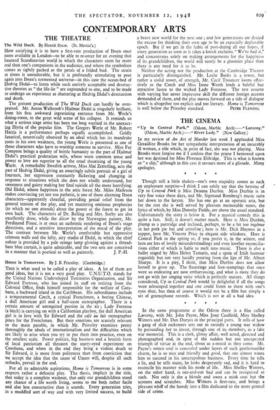Home is Tomorrow. By J. B. Priestley. (Cambridge.) Tins is
what used to be called a play of ideas. A lot of them are good ideas, but it is not a very good play. U.N.U.T.O. stands for the United Nations Undeveloped Territories Organisation, and Sir Edward Fortrose, who has joined its staff on retiring from the Colonial Office, finds himself responsible for the welfare of Cora- bana, a backward island in the Caribbean. His subordinates include a temperamental Czech, a cynical Frenchman, a boring Chinese, a dull American girl and a half-caste stenographer. There is a certain amount of unrequited passion in the air - Lady Fortrose (a bitch) is carrying on with a Californian playboy, the dull American girl is in love with Sir Edward and the café au lait stenographer pines for the Frenchman. But their emotions are scarcely relevant to the main parable, in which Mr. Priestley examines pretty thoroughly the ideals of internationalism and the difficulties which are likely to arise when you try to put them into practice, even on the smallest scale. Power politics, big business and a brutish form of local patriotism all threaten the starry-eyed experiment on Corobana, and when in the end they bring a violent death to Sir Edward, it is more from politeness than from conviction that we accept the idea that the cause of Unuto will, despite all such setbacks, prevail in the end.
For all its admirable aspirations, Home is Tomorrow is in some respects rather a defeatist play. The thesis, implicit in the title, that today is a complete washout, that only our grandchildren stand any chance of a life worth living, seems to me both rather facile and also less constructive than it sounds. Every generation tries, in a muddled sort of way and with very limited success, to build
a brave new world for the next one ; and few generations are denied the excuse for thinking their own age to be an especially deplorable epoch. But if we get in the habit of post-dating all our hopes, if every generation as soon as it takes a knock exclaims " We've had it," and concentrates solely on making arrangements for the happiness of its grandchildren, the world will surely be a gloomier place than there is any need for it to be.
Neither the acting nor the production at the Cambridge Theatre is particularly distinguished. Mr. Leslie Banks is a tower, but rather a stolid tower, of strength, Mr. Cecil Trouncer looms effec- tively as the Czech and Miss Irene Worth lends a baleful but attractive lustre to the wicked Lady Fortrose. The rest assume with varying but never impressive skill the different foreign accents demanded of them, and the play moves forward on a tide of dialogue which is altogether too explicit and too literary. Home is Tomorrow
is well below the Priestley standard. PETER FLEMING.


































 Previous page
Previous page